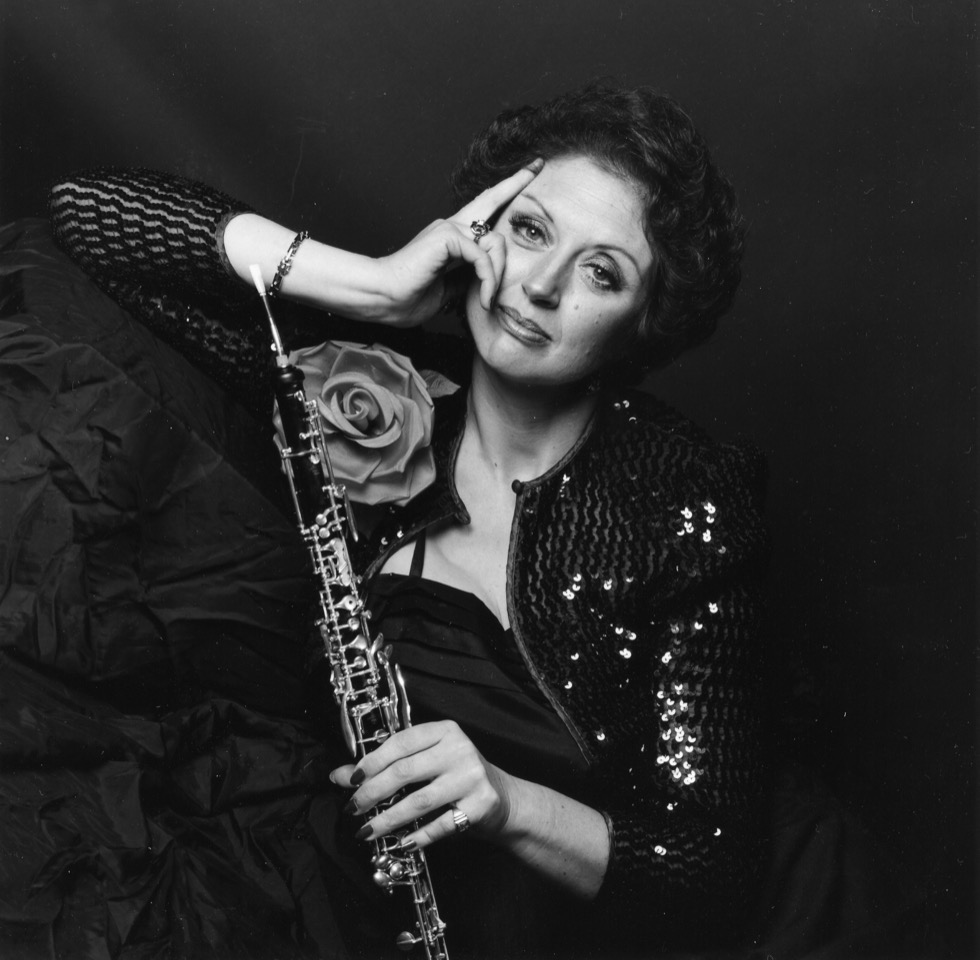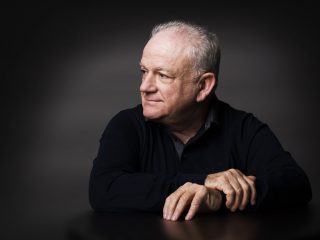
The Oboe d’amore: Mission Impossible I
In a slight change to normal proceedings, this month sees a guest blog in four parts by the musician Jennifer Paull. Across several decades, Jennifer commissioned and premiered many new works for oboe d’amore, her speciality, as well as the other members of the oboe family from musette to bass. The resulting repertoire is one she’s ensured is available for future generations to enjoy. These blog posts tell the story of her life in music and about the composers she worked with to create an amazing collection of new works, all readily available for all the 5 voices of the oboe family of instruments. Alternative parts are included in every publication for those who do not own a musette, oboe d’amore or bass oboe.
I first came across the words ‘Oboe d’amore’ in the early 1960s atop a page of the St Matthew Passion (Bach), during my first professional engagement. I was a student at the Liverpool Matthey School of Music at the time. As was the norm in those days, the obbligato had been transposed for oboe. There were literally so few instruments in the British Isles at that time, I seriously doubt the sum total would have exceeded a dozen. Even when I went on to the Royal College of Music in London, nobody had a single positive word to say about it. My Professor, Terence McDonagh, told me they were dreadful things, out of tune and useless, which he hoped (in vain) would quell my enthusiasm for so lost a cause.
A very few orchestras had one of their own and a member of the oboe section was obliged to play it two or three times a year or so, if (s)he couldn’t get out of the ‘chore’ in spite of trying everything to do just that! When the orchestra didn’t own an instrument, one was borrowed from somewhere else and sent via post. You can imagine how well that went down as fingering systems are not necessarily compatible, let alone reeds and any necessary adjustments due to shipping. Nobody had an oboe d’amore reed shaper – they were even more rare than moon rock was about to become half a decade later. So, the very mention of the words, ‘oboe d’amore’ inspired panic. Not in me! It was curiosity that nibbled away constantly at my mind and one fine day, during my RCM studies, I went to the Brompton Oratory and heard the B Minor Mass (Bach again!) with a real oboe d’amore for the first time! That was it!! My life changed in the course of one heavenly obligato.
I was fully aware by then, that there wasn’t much orchestral repertoire and precious little chamber music outside the Baroque. What little there was, was transposed for oboe and played that way far more often than not. I decided I had to get hold of one of my own – not an easy step at all and another story altogether!
I did obtain one (made for me in Paris in 1964) and that is when my future path modified dramatically. I was playing oboe and cor anglais in London orchestras by this time (BBC and ECO only as the others did not accept women in their wind sections – yet another story!) and became known as the oboe d’amore specialist to solve everybody’s panic moments. I travelled all over the country playing oboe d’amore and after a few years of this, I realised that my vocation was not to play it just every now and then with a diet of oboe and cor anglais taking up the majority of my time. I wanted to play it all the time and make its lack of repertoire my mission to solve and purpose to perform. How on earth could I do that, I wondered? It became obvious to me after a while. What I needed was to stop orchestral playing and find a way to work directly with composers. In those days, there were no music management courses or the like, so it was just a matter of thinking things through carefully. Composers were people who needed promotion. I needed repertoire. Perhaps there could be mutual benefit somewhere there? All very well, of course, but how was I going to earn a living, I wondered?
To be continued…
Jennifer’s blog returns next week but in the meantime, you can explore the incredible repertoire of music she has commissioned and performed here: Werner Icking Music Archive (WIMA)
ABOUT JENNIFER PAULL
Jennifer Paull (born Jennifer Irène Schulcz), represents the third generation of publishers in her family. Her grandfather, Ignácz Schulcz, was a publisher-printer in Léva (then in Austro-Hungary; now known as Levice in today’s Slovakia). This was also the hometown of their close family friend Eugene Fodor. Her uncle, Francis Aldor, was a publisher (Budapest and London) and cousin to Arthur Koestler. Aldor first published Fodor before the latter instigated his own Fodor’s Modern Guides publication company (and, in another forward thinking’ move, introduced André Deutsch to publishing). Aldor, Koestler and Fodor wrote for each other in this genre. Fodor studied at Grenoble University (France) with Paull’s father, Pavel Schulcz. Through her father’s maternal line, Paull is directly related to Giacomo Meyerbeer, Felix Mendelssohn and Arnold Schönberg.
Prior to eventually establishing her own publishing company, Amoris (International & Imprint), she had been Promotion Manager for Novello & Co. (London). Jennifer Paull also worked in the management of many well-known composers – Bruno Maderna (Concertdirectie de Koos, Laren, the Netherlands), Cathy Berberian and John McCabe (Jennifer Paull Management, London/Zürich) etc.
From an early age, she learned of the riches within the world of music through the enlightened guidance of a very patient piano and theory teacher. The discovery of the oboe d’amore, whilst an oboe and piano student at the Royal College of Music, changed both her life and that of this almost-forgotten beautiful instrument to which she subsequently dedicated her own. At that time, oboes d’amore were far more rare than they are today. Their proliferation is due, in great measure, to her pioneering work dedicated to the instrument’s cause. Jennifer Paull remains the only soloist in the world, ever, to have devoted a career exclusively to the oboe d’amore.
Music in all its guises, as well as performance itself, enabled her to explore her passion much more intensely. This extended from solo recitals and broadcasts to orchestral concerts and masterclasses, commissioning and publishing new repertoire, music therapy and education, the organisation of concerts and festivals and working in artists’ and orchestral management. The fascination with the Comparative Arts’ perspective of her subject led Jennifer Paull to writing. Amoris Imprint published Jennifer Paull’s book, ‘Cathy Berberian and Music’s Muses’, in 2007.
In 2009 Jennifer Paull donated the entire Amoris International repertoire of scores to the Werner Icking Music Archive.
The lens through which I view my subject is one of a musician who delights in the juxtaposition and oneness of all of the Arts; their comparison to my own and the very lack of separation and division between.
Jennifer Paull, a synæsthete, has two daughters and two sons. She lives in Switzerland near the French border in a charming wine-growing village not far from Montreux. She is the mother of the celebrated luthier Patrick Hufschmid and Pascal Hufschmid, art historian and world-renowned expert on Photography, currently Director of the International Red Cross and Red Crescent Museum, Geneva.
Léon Goossens, the most celebrated, legendary British oboist of the XX century, spoke of Jennifer Paull’s decision to devote her career exclusively to an instrument considered, at that time, as ‘obsolete’ in a recorded interview with Melvin Harris:
That lass has her head screwed on the right way. She’s absolutely right to make the d’amore her main instrument. If you want to master the d’amore, you can’t afford to be casual with it. It defies dabbling. I wouldn’t relish the thought of having to play anything major on it at short notice. It can be a temperamental and tricky instrument until you learn how to humour it properly. It has to be coaxed, and nurtured, but the effort’s well worth it when you draw that glorious voice from it…
Yes, she’s right to concentrate on it as her first choice. I’ve heard some dreadful playing from people who thought they could just pick it up and breeze away. And there’s a bonus of course. If you enchant people with the d’amore sound, then you’ll be sure to attract composers eager to write for you. That’s why she shows great wisdom by specialising. Good luck to her!
‘The Melvin Harris Collection’ of Léon Goossens’ complete recordings can be consulted in the Music Library, University of Washington, Seattle, USA.



